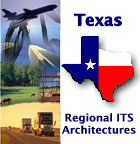| 1.0 | TRAVEL AND TRAFFIC MANAGEMENT |
| 1.1.0 | ITS shall include a Pre-Trip Travel Information (PTTI) capability to assist travelers in making mode choices, travel time estimates, and route decisions prior to trip departure. It consists of four major functions, which are, (1) Available Services Information, (2) Current Situation Information, (3) Trip Planning Service, and (4) User Access. Information is integrated from various transportation modes and presented to the user for decision making. |
| 1.1.3 | PTTI shall include a Trip Planning Service. |
| 1.1.3.2 | PTTI shall provide the capability for users to specify transportation parameters that are unique to their individual needs. |
| 1.1.3.2.1 | PTTI shall provide the capability for users to specify a desired destination. |
| 1.1.3.2.2 | PTTI shall provide the capability for users to specify a planned departure location. |
| 1.1.3.2.3 | PTTI shall provide the capability for users to specify their desired departure time. |
| 1.1.3.2.4 | PTTI shall provide the capability for users to specify their desired arrival time. |
| 1.1.3.2.5 | PTTI shall provide the capability for users to specify their maximum acceptable travel time. |
| 1.1.3.2.6 | PTTI shall provide the capability for users to specify their maximum acceptable number of mode changes. |
| 1.1.3.2.7 | PTTI shall provide the capability for users to specify a maximum number of transfers. |
| 1.1.3.2.8 | PTTI shall provide the capability for users to specify their preferred route(s) or segment of route(s). |
| 1.1.3.2.9 | PTTI shall provide the capability for users to specify their preferred transportation mode(s). |
| 1.1.3.2.10 | PTTI shall provide the capability for users to specify their preferred weather conditions. |
| 1.4.0 | ITS shall include a Ride Matching and Reservation (RMR) function. Ride Matching and Reservation will provide travel users with information on rideshare providers. Three major functions are provided, which are, (1) Rider Request, (2) Transportation Provider Services, and (3) Information Processing. This will also include a billing service to the providers. |
| 1.4.1 | RMR shall include a Rider Request capability. |
| 1.4.1.1 | Rider Request shall provide the capability for a traveler to request a ride by placing a single request from a facility to include, but not be limited to, the following: |
| 1.4.1.1(a) | Telephones (including hearing-impaired capability). |
| 1.4.1.1(b) | Kiosks. |
| 1.4.1.2 | Rider Request shall provide a traveler the capability to request a specific itinerary by specifying, but not be limited to, the following: |
| 1.4.1.3 | Rider Request shall provide the traveler with the available ridesharing options, based on the traveler's request and specified itinerary. |
| 1.4.1.4 | Rider Request shall also include the capability to perform real-time ridematching by instantly matching rider and driver. |
| 1.5 | TRAVELER SERVICES INFORMATION |
| 1.5.2 | TSI shall include an Information Access function that allows travelers to access the available information. |
| 1.5.2.5 | Information Access shall provide the capability for travelers to access the TSI information via any of, but not limited to, the following methods: |
| 1.5.2.5(f) | Public area kiosks. |
| 1.5.2.6 | Information Access shall provide the capability for travelers to access TSI information from public kiosk locations which include, but are not limited to: |
| 1.5.2.6(b) | Activity centers. |
| 1.5.2.6(c) | Tourist attractions. |
| 1.5.2.6(d) | Service plazas. |
| 1.5.2.6(e) | Airports. |
| 2.0 | PUBLIC TRANSPORTATION MANAGEMENT |
| 2.3.0 | ITS shall include a Personalized Public Transit (PPT) function. |
| 2.3.1 | The PPT shall include a Rider Request function. |
| 5.1 | EMERGENCY NOTIFICATION AND PERSONAL SECURITY |
| 5.1.3 | ITS shall include a Remote Security and Emergency Monitoring (RSEM) function to create an environment of safety in remote areas. |
| 5.1.3.1 | RSEM shall include specific Secure Areas. |
| 5.1.3.1.1 | The Secure Areas shall encompass all physical areas related to travel including but not limited to the following: rest stops and picnic areas, park-and-ride areas, tourism and travel information areas, remote roadways, emergency pull off areas, and work zones. |
| 5.1.3.1.2 | All Secure Areas shall have traveler-activated alarms. |
| 5.1.3.1.3 | There shall be included automatically activated alarms in the secure areas for theft, vandalism, fire, etc. |
| 5.1.3.2 | RSEM shall include a Security Sensors (SS) function. |
| 5.1.3.2.1 | SS shall provide that sensor technology required to alert operators and police of potential incidents. |
| 5.1.3.2.2 | SS shall include both video and audio systems at key locations to monitor activities. |
| | |












 Web Spinner Technology.
Web Spinner Technology.